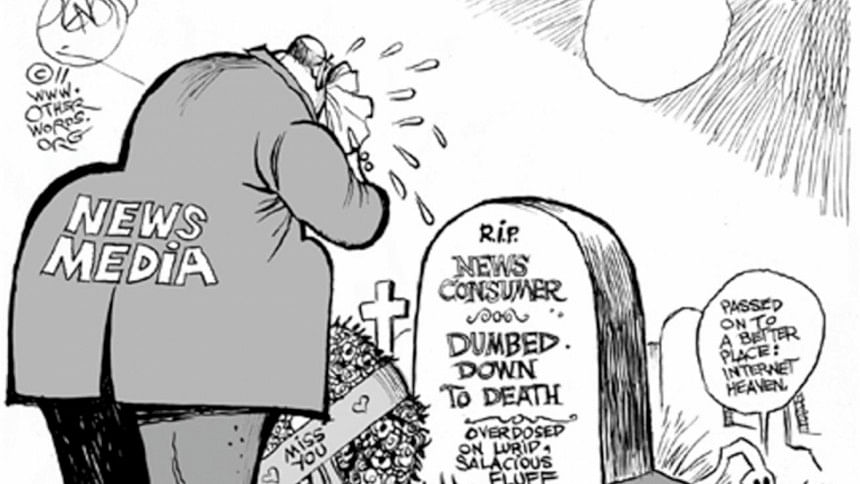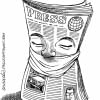US Media: Free but not trustworthy?

The world recently observed the World Press Freedom day. The UNESCO-sponsored day has brought attention to the challenges of freedom of expression and the press in the developing world. Consequently, the situations of media, which are appalling in many countries due to war and conflict, also came under scrutiny. However, media in developed western countries, especially in the United States, is usually left out from the scrutiny. Media in the US enjoy freedom; but how well are they serving citizens?
Recent events in the US shed light on the contemporary conditions of media in America. First, a recent survey finds that only six percent of Americans now trust the press. American Press Institute, University of Chicago and the Associated Press conducted the study in February and March this year, polling a representative national sample. The trend of citizen's trust on media has been downward for some time, but this is the lowest rating ever.
Moreover, while addressing the White House Correspondents Dinner, President Obama took a swipe at the American cable television giant CNN. The event was meant to be humorous, and the host (usually a comedian) and the president usually talk about different issues in a lighter tone. It's customary that the speakers "roast" (take comedic swipes at) politicians, journalists, actors and other well-known personalities. President Obama, pointing to Jake Tapper, who recently left ABC News (American Broadcast Corporation) to join CNN, quipped that Tapper has "left journalism" to join CNN.
Media, especially electronic media, also came under fire for their coverage of presidential candidate Donald Trump who has become the presumptive Republican nominee, surprising many. There are multiple reasons for his rise but critics are already pointing fingers at media. Trump received a disproportionately high volume of air time throughout the campaign. One might say that the coverage was not all positive, but we need to remember that negative coverage is also publicity. Trump, longtime host of a successful reality TV show, understands media and thus, manipulated media coverage by constantly creating controversy. Media, on the other hand, failed to ask tough questions to the candidate or press for answers from him, thereby failing to frame the discourse; instead, it was dictated by Trump.
So what is ailing the US media? The framers of the US constitution enshrined freedom of press, expecting that a free press will function as the fourth estate and keep democracy in shape by informing citizens of important issues and mounting a robust criticism of the government. The fact that only 6 percent of the country's people trust media is a strong indicator that media there is not functioning the way it should. There were times when people trusted the US media, and it exerted tremendous influence on political processes. The classic case of the Watergate scandal and the fall of Nixon are often cited to illustrate exemplary investigative journalism and media's pursuit of important issues. Americans considered Walter Cronkite as the most trusted man in the country when he was a CBS news anchor.
So, what changed? A lot of things. But perhaps the most significant change is the cheapening of news, which academic scholars referred to as "infotainment." Infotainment is the blending of news and entertainment - both in content and delivery. The tension between information and entertainment always existed, but professional editors always maintained a firewall between the two. On the other hand, media executives always favoured entertainment over information, because entertainment-oriented programmes attract large audiences and it's good for the bottom line of the corporations. History shows that when radio and television were becoming popular forms of mass media, executives heavily favoured entertainment programming. They resisted the idea that successful news programming was even possible in electronic media. Daniel Hallinin, in an article titled "Whatever Happened to the News?", recounted the history of television news in the 1960s, during the golden age of television, when the network television expanded their news operation and largely separated from entertainment television. However, in the 1970s and 80s, the line between news and entertainment began to blur and this continued for decades. The result is today's 'infotainment'.
Media's pursuit of infotainment became full-blown exercise during Donald Trump's campaign. Trump would tweet in the middle of the night and electronic media, especially cable television, would spend the whole day talking about those tweets! Except during the debates, media as a whole failed to ask him tough questions on his outrageous claims. Trump made claims about erecting a wall along the US-Mexico borders - media did not press him hard enough about why and how the wall would be made. Some in media questioned the utility of the wall, given that the net migration from Mexico has dwindled. The same can be said about media's handling of Trump's trade and foreign policy proposals.
Infotainment helps media's profit margins because it's relatively inexpensive to produce a talk show than put together a quality news programme. Over the years, newsroom budgets have been slashed, news staffers downsized and many foreign bureaus closed. Therefore, mixing news with entertainment was welcomed by media executives. Some of the infotainment programmes, especially the politically charged conservative talk shows (for instance, The O'Reilly Factor hosted by Bill O'Reilly) drew larger viewers. People watch those talks shows not to obtain information but to enjoy combative encounters, personal attacks, and most importantly, to identify with and reinforce their already-held political views.
As political economists and other critical scholars argue, turning news into entertainment not only benefits the corporations financially but also help ruling elites maintain the status quo. The classical function of news is to inform citizens of critical issues so that they are better able to exercise their rights and keep democracy in shape. A diluted version of news, which is akin to entertainment, certainly cannot perform that function. It's important that we pay attention to what is going on in the US currently, because we have too often seen the US model being replicated in other countries.
The author teaches media and communication at a college in the US.

 For all latest news, follow The Daily Star's Google News channel.
For all latest news, follow The Daily Star's Google News channel. 








Comments